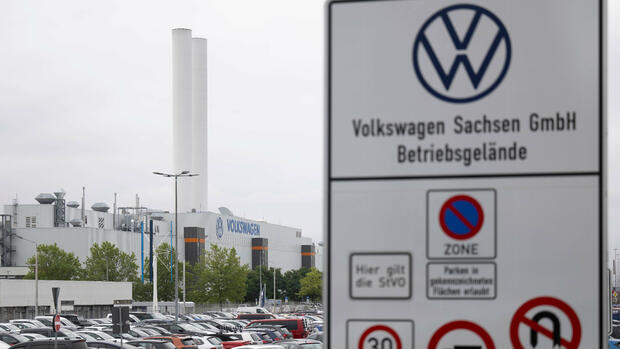The location is no longer working for almost 270 employees. For the majority of those on temporary contracts, the future remains uncertain.
(Photo: dpa)
Dusseldorf Demand for electric cars at Volkswagen is developing weaker than expected. That’s why Germany’s largest car manufacturer is now cutting jobs. As the company announced on Thursday, the contracts of 269 temporary employees at the factory in Zwickau, Saxony, will not be extended.
In addition, the future of almost 2,000 other temporary employees remains uncertain. Decisions about their continued employment will be made in tranches and depending on the market situation over the next few weeks and months. The job cuts were announced on Thursday at a works meeting at the site.
Almost 11,000 employees currently work for VW in Zwickau. To ramp up electromobility, the car company had hired 2,700 employees on a temporary basis, 540 of whom were given permanent contracts before the summer break. The plant in Saxony is Volkswagen’s only purely electric car factory. The VW electric cars ID.3, ID.4 and ID.5 as well as the Audi Q4 e-tron and the Cupra Born are built at the location.
Lull in e-car purchases: Low demand due to capped funding
However, the electric transition is currently off to a slower start than planned, which is also reflected in the production figures. The employees at the plant could actually produce around 350,000 vehicles a year – but in fact there were only 218,000 in 2022. According to company circles, around 300,000 cars were planned for this year in Zwickau.
In addition to the high prices for electric cars and electricity, the continued high inflation and, above all, the reduced electric subsidy are cited as reasons for the low demand. “Mr Habeck has done a great job in destroying the German car industry,” says car expert Ferdinand Dudenhöffer to the Handelsblatt with a view to the disappearance of the funding bonus. The subsidy had already been capped at the beginning of the year: instead of a maximum of 6,000 euros in funding, there has since been only a maximum of 4,500 euros. Since September, the state has also canceled electric car subsidies for commercial customers.
>> Read also: Highly subsidized and 20 percent cheaper: Why the EU is taking action against Chinese electric cars
At the moment, operations in Saxony are still running in three shifts on both assembly lines. The shift distribution will probably have to be adjusted, VW said on Thursday. According to company circles, the question of cutting a shift in the ID.3, ID.4 and Cupra Born production hall is under discussion. The specific procedure will be coordinated with the employee representatives in the coming days.
The fact that there would be job cuts had already been politically leaked. Saxony’s Prime Minister Michael Kretschmer said on Tuesday evening at a CDU regional conference in Riesa: “In the next few days, maybe hours, we will hear regrettable news.”
The CDU politician had already commented on job cuts in Zwickau on Tuesday.
(Photo: dpa)
People were proud of what Volkswagen had achieved in Saxony when it came to electromobility. But now you have to realize: “In the end, it’s not quite that successful. A number of colleagues will no longer be able to work there, at least temporarily. This will frustrate these people.”
VW brand boss Schäfer: Dip in demand for electric cars only an “intermediate low”
In the first half of the year, Volkswagen said it sold 321,600 electric cars, almost 50 percent more than in the same period last year. However, the high registration numbers only partially reflect the actual market situation because VW – like the entire German auto industry – is currently still relying on a huge mountain of orders that has built up in times of the corona crisis and chip shortages.
However, according to dealer and corporate circles, the number of new orders is too low. Incoming orders for VW electric vehicles in the summer, when the Handelsblatt had already reported on the problem, were 30 to 70 percent below the planned level, depending on the model. The company did not want to comment on the figures at the time.
VW brand boss Thomas Schäfer recently said: “We assume that the share of electric cars in Europe will increase significantly in the coming years.” The current purchasing reluctance is only an “interim low”.
The electric transition at VW is not only stalling in Saxony. In Emden, the factory holidays in electric car production were extended at the end of June due to insufficient capacity utilization; 300 of a total of 1,500 temporary employees had to leave at that time.
As in Saxony, what happens next at the site depends on the capacity utilization of the factory from 2024. According to company circles, management is currently not in a position to provide more precise information from which the number of units and, based on this, driving patterns with cycle times and shifts can be derived.
More: The private customer business with electric cars is collapsing in Europe
